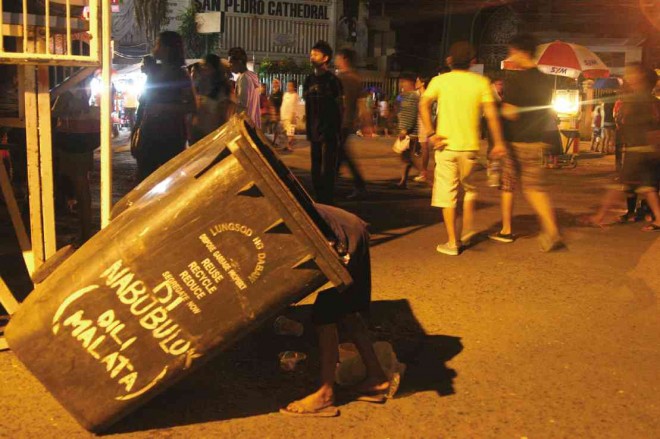Child labor: Childhood spent on dangerous jobs

A SCENE in Davao City that is repeated many times over elsewhere—that of a child digging into garbage bins for food or recyclable materials—has become all too familiar that no one seems to bother asking why it is happening. KARLOS MANLUPIG
Sixteen-year-old Raymond started selling vegetables at the local market when he was 8.
At that age, Raymond knew his parents needed help to bring food to the table and send his five siblings to school.
When he turned 11, the boy tried his luck by working in a bottle-recycling company.
“Our job was to clean dirty bottles,” Raymond said.
“We first submerge the bottles in water mixed with chemicals. You will see how dirty the bottles were because the water will turn black,” he said.
He pointed to his nails with perforations. They were because of the chemicals, he said.
“It was not unusual for us to get wounded because of the broken glass. It was very normal for us to have a fever because of the infection,” he added.
By the time he was 14, Raymond was already a worker for a fertilizer company. His job was simpler, according to him.
“I had to carry sacks of fertilizers. But a sack weighs 50 kilograms. It was hard for someone who is 14 years old,” Raymond said.
He said he would usually ask for the help of other workers to place the sack on his back because he cannot lift it.
After his brief stint at the fertilizer company, Raymond worked as a port laborer, manually filling sacks of pig feeds from a ship and carrying it down to the port. He was paid P1 per sack and worked from 7 in the evening to 4 in the morning, earning an average of P190 per day.
“That job was very hard. Every night, I suffered from sore muscles. It was very painful,” Raymond said.
Raymond admitted that his parents had asked him to work and help the family but stressed that it was also his decision.
Florie May Tacang, executive director of Kaugmaon for Children’s Rights and Social Development, said that in the course of the group’s monitoring and organizing work in the villages of Ilang, Tibungco, Panacan and Callawa here, the group was able to document and provide services to at least 383 child laborers.
For Kaugmaon, the immediate need was to provide counseling to children and their parents, Tacang said.
“In the communities, we also share knowledge on values formation, family planning and proper parenting,” Tacang said.
“We also provide livelihood projects for the parents so that they will have options,” she added.
Kaugmaon said the parents must not be blamed and urged the public and the government to look at the root causes—lack of access to education, lack of decent health service, insufficient opportunities and poverty among others.
Tacang said her group is working closely with village officials to monitor and document cases of child labor.
Some villages now have integrated child labor as issues that must be addressed by village councils for the protection of children.
Efforts to address child labor must be recognized, Tacang said.
“However, we should not forget that more things must be done. This is not an issue that must be solved by the parents and their children alone. The entire community and the government have a huge responsibility. We must help,” Tacang said.
On June 12, the world will be observing the World Day Against Child Labor and about a thousand child laborers and their parents will march in Davao City.
Raymond, now 16 and a Grade 7 student, will be one of those who will march on the streets of Davao.
He said he would march to show that it was not his or his parents’ fault that he is a child laborer.
His family was forced by circumstance and they want this to change. Raymond is hoping that, in the future, no child will have to work because of poverty.